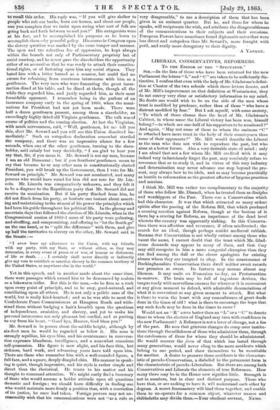LIBERALS, CONSERVATIVES, REFORMERS.
To THE EDITOR OF THE "SPECTATOR."
SIR,—In the lists of those who have been returned for the new Parliament the letters "L" and "C" are taken to be sufficiently dis- tinctive. I confess that even with the help of Mr. Gladstone's defini- tion at Chester of the two schools which those letters denote, and of Mr. Mill's improvement on that definition at Westminster, they do not convey very clear or satisfactory information to my mind. No doubt one would wish to be on the side of the men whose trust is modified by prudence, rather than of those "who have a distrust modified by fear." But I ask myself, with some anxiety, "To which of those classes does the head of Mr. Gladstone's Cabinet, in whose name the Liberal victory has been won, himself belong ?—in which are one-half of his supporters to be numbered ?" And again, "May not some of those to whom the ominous "C" is attached have more trust in the body of their countrymen than some of their opponents ?" Mr. Mill would describe the Liberal as the man who does not wish to reproduce the past, but who aims at a better future. Also a very desirable state of mind ; only I am afraid that not a few whom Mr. Mill credited with it may indeed very industriously forget the past, may resolutely refuse to reverence that or to study it, and in virtue of this very industry and determination may never advance one step beyond the pre- sent, may always bow to its idols, and so may become practically as hostile to reformation as the greatest effecter of bygone practices and maxims.
I think Mr. Alin was rather too complimentary to the majority of those who follow Mr. Disraeli, when he treated them as disciples and worshippers of the Past. There was a Conservatism which had this character. It was that which attracted so many ardent spirits after the passing of the Reform Bill, that which produced a seeming reaction against Reform, though at the bottom of it there lay a craving for Reform, an impatience of the dead level whereto the country was apparently sinking. In this Conserva- tism there was affection and reverence, if often misdirected ; the search for an ideal, though perhaps amidst medimval rubbish. Because that Conservatism is not wholly extinct among those who vaunt the name, I cannot doubt that the trust which Mr. Glad- stone demands may appear in many of them, and that they may still recognize in him a more congenial champion than they can find among the dull or the clever apologists for existing abuses whom they are tempted to obey. In the countenance of Buckinghamshire Conservatism there dwell neither sweet records nor promises as sweet. Its features may assume almost any likeness. It may smile on Romanism to-day, on Protestantism to-morrow. The brain may be full of ingenious devices, the tongue ready with marvellous excuses for whatever it is convenient at any given moment to defend, with admirable denunciations of what it is convenient at any given moment to attack. But what is there to warm the heart with any remembrance of great deeds done in the times of old? what is there to encourage the hope that any such deeds may be done in the times to come ?
Would not an "R" serve better than an "L" or a "C" to denote those to whom the electors of England may turn with confidence in the new Parliament? A Reformer is not a lover of change, not a foe of the past. He sees that grievous changes do creep over institu- tions through the selfishness of those who administer them, through the carelessness of those for whom they should be administered. He would recover the form of that which has lasted through many generations, would never cling to the mere accidents which belong to one period, and show themselves to be unsuitable for another. A desire to preserve these accidents is the character- istic of pseudo-Conservatism, a disbelief in the permanent form is the characteristic of pseudo-Liberalism. But there are among both Conservatives and Liberals the elements of true Reformers. How many there may be in the House now signifies little. Strength is not in numbers, but in clear and distinct purpose. Those who have that, or are seeking to have it, will understand each other by degrees. A secret freemasonry will bind them together, and enable them to co-operate for a common object, whatever names and shibboleths may divide them.—Your obedient servant, NEMO.






























 Previous page
Previous page